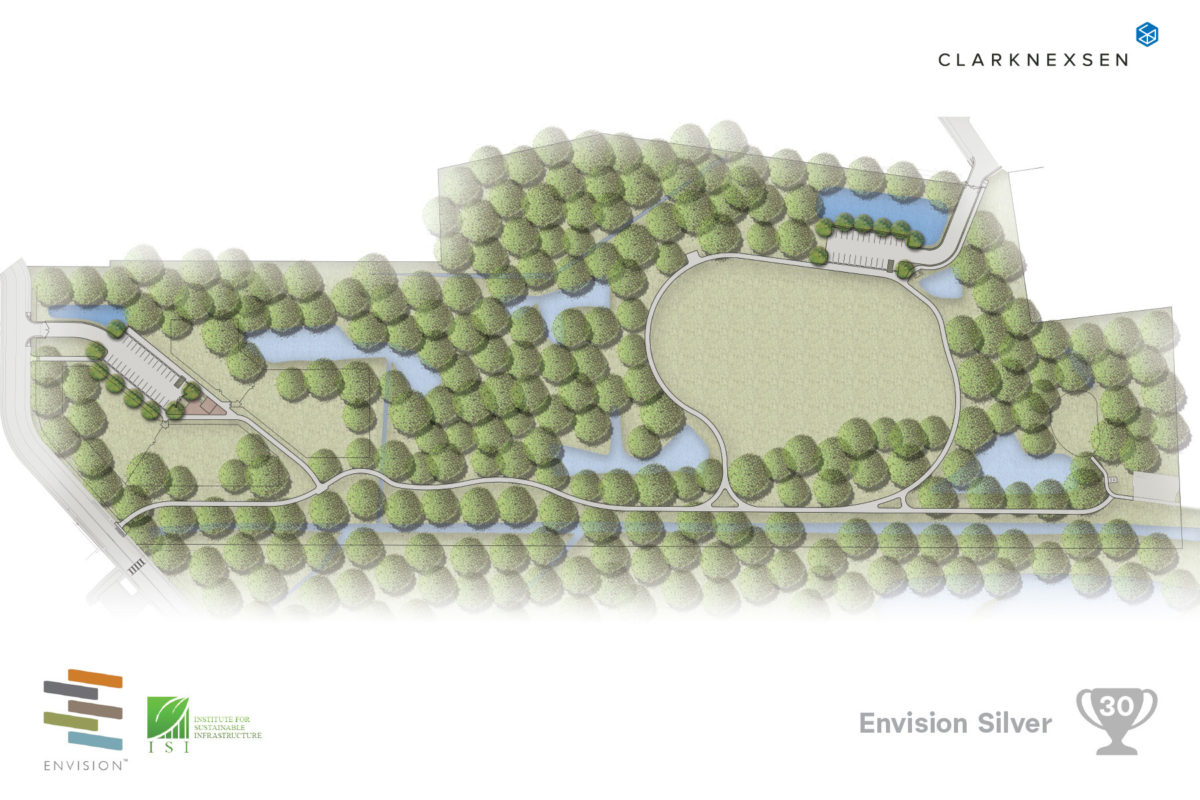Virginia Beach’s Marshview Park Phase 1 Project Earns the Envision Silver Award for Sustainable Infrastructure

Virginia Beach Parks & Recreation’s Marshview Park Phase 1 project recently received an Envision Silver award from the Institute for Sustainable Infrastructure (ISI). The park is the second project in the state of Virginia to earn an Envision sustainable infrastructure rating system award. The Envision system rates the sustainability of infrastructure projects across the full range of environmental, social, and economic impacts.
“We wanted to keep the Marshview Park area as natural as possible for city and area residents while creating an engaging recreation space,” commented Clark Nexsen senior civil engineer, Allyson Monsour. “We are proud of this project. It is the first Envision verified project in Hampton Roads and it sets a precedent for future sustainable infrastructure design in the area.”
The Marshview Park Phase 1 project will provide a 17.9 acre park with recreational amenities open to the public during the day in Virginia Beach. The park will include an eight-foot wide paved trail, fenced-in dog parks, a multi-purpose playing field, and two new parking lots. Picnic shelters, benches, a playground, and a restroom facility are planned for future development within the park. Associated landscaping, aesthetics, stormwater management, and other infrastructure improvements will also be provided.
The Envision system rates the impact of sustainable infrastructure projects as a whole by measuring sustainability in five categories: quality of life, leadership, natural world, resource allocation, and climate and risk. These key areas contribute to the positive social, economic, and environmental impacts on a community.
Some of the sustainable accomplishments of the project include:
Quality of Life
The Marshview Park Phase 1 project will make the existing park and surrounding neighborhoods safer and more accessible. There are also almost six acres of wetlands on the property, which will remain largely undisturbed, allowing park users to enjoy the natural features of the land. The current dirt path will be replaced with the eight-foot wide asphalt trail, which will meet American Disability Act (ADA) standards and allow runners, walkers, cyclists and others to safely navigate the trail. The trail will also connect entrances on either side of the project so users can travel between neighborhoods safely and more efficiently. In addition, the separated, fenced-in dog parks will provide an area for dogs without compromising the safety or comfort of other park users.
Resource Allocation
The project team specified that all materials required for this project, including plants, aggregates, and soils are locally sourced. The project team also designed the site with minimal changes to grading, helping to balance the cut and fill ratio, which reduces the transportation and environmental impacts associated with taking excavated materials off site.
Natural World
Time-of-year tree clearing restrictions were implemented to protect the habitat of the endangered Northern Long Eared Bat. Impacts to existing wetlands and forested areas on the site have also been minimized and signage will be included to help protect wetland areas from park users’ disturbance, and will educate users about the important functions of wetlands. Marshview Park will also be constructed and maintained to remove invasive species from the site, and discourage their re-establishment.
Climate and Risk
The region in which this park is located is second only to New Orleans in vulnerability to sea level rise in the country. The Marshview Park project with its green space and natural wetlands, offers a range of benefits to the host and neighboring communities, including flood control. No critical infrastructure is located within the park that could be affected by changing climate conditions and the park acts as an important buffer.
The Envision rating system is the product of a joint collaboration between the Institute for Sustainable Infrastructure (ISI), which was founded by three national engineering associations: American Society of Civil Engineers, American Council of Engineering Companies, and American Public Works Association, and the Zofnass Program for Sustainable Infrastructure at Harvard University Graduate School of Design. Clark Nexsen is a charter member of ISI and has supported the Envision rating system since 2012 when it was launched.
Minimizing environmental impact is a core value at Clark Nexsen. As part of their commitment to the environment, the architecture and engineering firm has signed the AIA 2030 Commitment, with the goal of designing carbon-neutral buildings by the year 2030. Clark Nexsen is a Top 10 Green Design Firm as ranked by ENR in their Southeast and MidAtlantic regions and both ENR and BD+C rank Clark Nexsen nationally among the Top 50 Green Design Firms.
